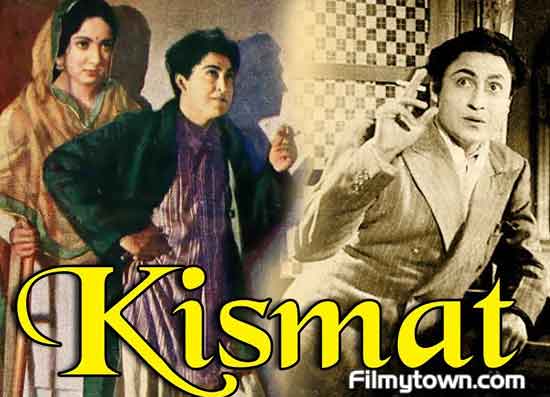This was the first blockbuster hit in the thirty year young Hindi Film Cinema at that time that Ashok Kumar’s Kismet first to cross the threshold of Rupees One Crore an unheard of figure for film collection in that era. A record that was broken by Raj Kapoor’s ‘Barsaat’ a few years down the line. If one adjusts that for inflation and take gold as the standard for inflation then that amount would work out to a whooping Rs.1000 crores today (gold rate was Rs.51 per 10 grams in 1943 vs today’s rate of 51k per 10 grams).
Kismet was also the first movie to show the hero with negative attributes like continuous smoking, drinking, gambling and of course robbery. The issue of unwed mother was also touched upon, despite these factors which had a shock value in a pre-independence conservative India, the movie still did roaring business and ran for over three years in a single talkies in Calcutta, this too was unprecedented. The fact that Ashok Kumar the hero of the movie was the first superstar of the Industry is less celebrated as this was eons ago, but the fact still remains, he looked dapper in suits and specially the turban. Kismet was the first film which established the lost and found code which was very successfully exploited in some of the later day movies especially by Manmohan Desai in his works. There were both Hindi and other language remakes of this movie.
Shekhar (Ashok Kumar) is a known thief and pickpocket only just released from jail but back at his job he lightens a person of his own profession of an expensive watch, he meets the person Banke again when he tries to pawn the watch with his broker (David), Banke offers him a bigger job of looting his boss but Shekhar leaves it for the time being. Later he meets the real owner of the watch who wanted to sell it to see theatre where his daughter Rani (Mumtaz Shanti) is performing. Rani is under the obligation of the theatre’s boss Indrajeet (Mubarak), due to her father’s debts. Taking a liking for the old man he takes him to watch the show only to find out that the impish Indrajeet was none other than the old man’s own employee and due to the change in fortune was now the owner of the theatre.
As fate would have it one thing leads to another and Shekhar happens to rent a place in Rani’s house and finds about her travails in life, a threatening boss and a injury in the leg which is making it more and more difficult for her to act in the theatre and to make matters worse she discovers her younger sister is to be an unwed mother of Indrajeet’s son Mohan’s child. As he is drawn towards Rani, he takes it upon himself to help her out of the situation and accepts Banke’s offer to loot his employer who is none other than Indrajeet. Though the attempted dacoity is a failure due to the information given by the pawnbroker of the break-in, but while escaping the cops Shekhar drops his locket he has worn since childhood which is recognized by Indrajeet as his son Madan’s who had left him as a child after an argument. This leads to the climax as Indrajeet changes his ways and accepts both the sisters as his daughters-in-law.
Kismet was an out and out masala film as opposed to soft socials and mythologicals of that era and thus a totally new formula was attempted for the first time on the Indian movie scene, it proved to be a hit. It was very well made with good story and easy flowing matter of fact acting by Ashok Kumar, it truly was a worthy predecessor of our later day movies of a thief with a heart of gold stories.
This was an era before Lata Mangeshkar was a popular playback singer and had entered the Industry in 1942. The female voice for this movie was given by Ameerbai Karnataki, the music was by Anil Biswas, two of the songs stand out “Dhire Dhire aa re Badal, mera bulbul so raha hai” and “Door hato aye duniya walon Hindustan hamara hai” a subtle hint at the Quit India movement of the Mahatma started in 1942, thus it became famous and was a tagline in many a freedom movement campaigns, thus whipping passions and a proposed ban on the movie and the imminent arrest of the lyrics writer Kavi Pradeep who had to go incognito to avoid arrest at the hands of the British.
Kismet was a presentation of Bombay talkies, a legacy of Himanshu Rai which gave many hit movies. Ashok Kumar had a fulfilling career spanning 60 years upto the late ‘90s.
– Revisited by PAWAN GUPTA



